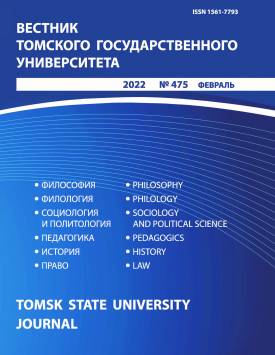The Krasnoyarsk banquet of Colonel Mikhail Fedorovich on 22 October 1918: The “anatomy” of the political scandal in the context of the democratic counter-revolution
In the article, for the first time, the author analyzes the causes, circumstances and consequences of the banquet that Colonel Mikhail I. Fedorovich, the chief of the garrison of Krasnoyarsk, arranged on 22 October 1918 in honor of the arrival of military trains of foreign allies of the Provisional All-Russian Government. At the banquet, there was a political scandal related to the performance of the anthem of the former Russian Empire “God Save the Tsar!”, which was perceived at the initial stage of the Civil War in Russia as a violation of the norm. The author aims to explain the relations between officers, society and the government in the conditions of the democratic counterrevolution in Yenisei Province, which was the “middle” territory of the anti-Bolshevik political regime in the east of Russia. The research is based on the methods of concrete historical analysis and cultural semiotics. In terms of semiotics, the scandal is one of the basic mechanisms of culture. Deliberate violation of the accepted system of values is aimed at breaking established norms and seizing leadership. External spontaneity, symbolism, excessive emotionality and lack of detailed argumentation are considered as necessary characteristics of a scandal. The research is based on a wide range of diverse sources - periodicals, office documents and materials of personal origin. As a result of the analysis, the author comes to the following conclusions. The main “author” of the political “challenge” was Colonel Fedorovich, the head of the garrison. Along with the organization of a large-scale celebration and the role of its manager, he assumed the representative functions of power. The head of the garrison positioned himself as the first person of Krasnoyarsk and the entire Yenisei Province. In doing so, he violated the basic principle of the democratic counter-revolution, which placed the army out of politics. Fedorovich's statements that the banquet “did not have a political connotation” refer only to the fact that the head of the garrison and most of the officers of his staff headquarters were not monarchists in the literal sense of the word. They were adherents of the unity of command and patriots of the image of great Russia, which did not then have its own anthem. In addition, the banquet demonstrated the disdainful attitude of the military to the self-government bodies and the slogans of the popular rule. This was a blow to the hierarchy of values of the democratic counter-revolution. All the “incidents” of the banquet and their subsequent interpretations became an expression of the conflict of interests and values of the military and the socialists who fought for power as representatives of self-government bodies and the public. The consequences of the events of October 1918, the public culmination of which was the scandalous banquet, were negative. Krasnoyarsk, which was one of the most democratic administrative centers in Siberia, became a city with the most severe military intervention in political processes and in the life of the population.
Keywords
Mikhail Fedorovich, officers, state power, political practices, democracy, socialism, monarchism, Civil War, SiberiaAuthors
| Name | Organization | |
| Sheremeteva Daria L. | Institute of History of the Siberian Branch of the Russian Academy of Sciences | dalas83@yandex.ru |
References

The Krasnoyarsk banquet of Colonel Mikhail Fedorovich on 22 October 1918: The “anatomy” of the political scandal in the context of the democratic counter-revolution | Vestnik Tomskogo gosudarstvennogo universiteta – Tomsk State University Journal. 2022. № 475. DOI: 10.17223/15617793/475/22
